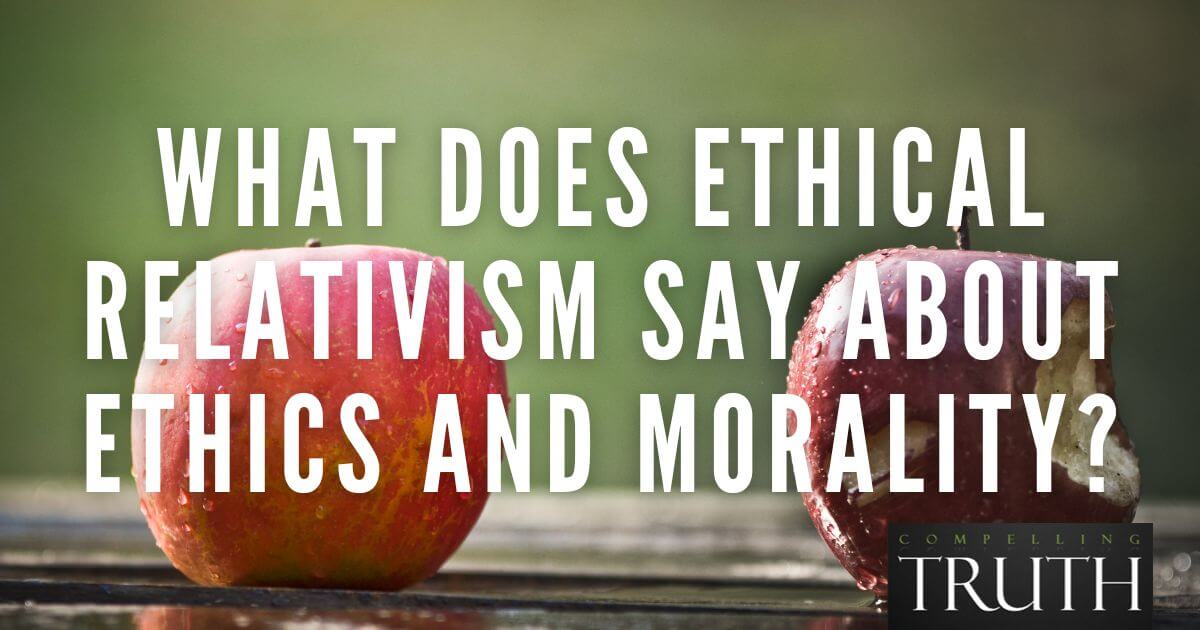The philosophy of ethics consists of three intertwined parts. Metaethics is the study of ethics. Applied ethics consists of discussions about the morality of specific actions in various fields. Normative ethics falls in between metaethics and applied ethics. It is the study and development of ethical frameworks and guidelines that can be used to judge whether an act is right or wrong. Although it is informed by metaethics, the different normative schools are not directly related to any given metaethical philosophy. And although normative guidelines are used to determine morality in applied situations, normative ethics does not claim to list ethical actions.
The Bible presents ethics as rooted in God’s character and revealed through His Word. God provides absolute principles (Deuteronomy 6:13), laws for specific contexts (Leviticus 20:26), and guidance for developing character (Galatians 5:22–23). Ethical behavior is not about human constructs or changing cultural norms but about living in obedience to God’s will (Micah 6:8). The Bible calls believers to rely on God’s Word and Spirit for moral guidance, rather than on subjective or human-centered systems (Proverbs 14:12).
Any subject of philosophy is open for interpretation, but there are generally four basic schools of secular normative ethics. Each religion may be said to have their own framework as well, but for the sake of relevance, only secular and Christian ethics will be considered here.
DEONTOLOGICAL ETHICS
Deontology is the branch of normative ethics that claims morality is based on adherence to set standards. That is, if an act follows an established law, it is moral. If it breaks a law, it is immoral.
Moral Absolutism
Moral absolutism is the only secular normative ethical school that insists that ethical standards exist as absolutes, which do not change for person, situation, or era. There are three different opinions as to how ethics gain this authority.
Natural Law/Natural Rights claims that with creation or evolution, mankind was endowed with certain "operating procedures" that are universal to every person in every culture. These absolute, unchanging standards of behavior can be uncovered with careful analysis of that part of human nature which is universal to all mankind.
Contractarianism says that an action is moral if and when it becomes a necessary step in fulfilling a contract. Contracts are voluntary and can be deliberate, as a legal business contract or wedding vow, or assumed, as the responsibilities of a citizen to follow state law.
Divine Command Theory insists that ethics are determined by the word of God only.
Kantian/Duty Ethics
Immanuel Kant believed that moral absolutism didn't go far enough. In addition to following a law or standard, he insisted the action must have been performed intentionally and with the goal of being moral. Selfish and accidental acts, no matter how closely they follow rules, cannot be ethical.
Deontological Axioms
Contemporary deontology and the non-aggression principle are two axioms that are often applied to other deontological schools. Contemporary deontology teaches that an act that causes harm can only be moral if it is ultimately for some greater good. The non-aggression principle states that force or violence is only ethical if used in self-defense against an aggressor.
CONSEQUENTIALISM
Consequentialism starts as a relatively logical school of normative ethics, but it quickly loses itself in the weeds. Adherents cannot agree on basic terms but do agree that it's too complicated to be of any practical purpose. In general, it states that an act is good if it results in good. Unfortunately, that's where consensus ends.
What is good?
Consequentialists can't agree. Is it increased pleasure or decreased pain? Protection of rights or advancement of the state? Hedonism, personal preference, or well-being?
Good for whom?
Since, by definition, the acting agent is doing the acting, it would be reasonable to assume an act is moral if it results in good for the acting agent. But what about altruism? Isn't it a better good to provide for another? Or would it be best to provide the greatest overall good for everyone involved, as egalitarianism teaches?
Who determines what is a good consequence?
As in the previous issue, consequentialists argue over who is qualified to judge "a good consequence." It could be the acting agent, an objective by-stander, a knowledgeable panel, or an imaginary omniscient being who can see and rightfully judge all.
What about good intentions?
Like Kantian deontologists, some consequentialists would like to make allowances for an acting agent who intends good but, because of ignorance or accident, does not accomplish it. Others, more concerned with judging the act than the agent, reject this train of thought, insisting that only the actual result matters.
ETHICAL RELATIVISM
Ethical relativists refuse to believe that morality is based solely on adherence to a law or the result of an action. Instead, they take into account culture, circumstances, and beliefs.
Cultural/Descriptive Relativism
Cultural relativism isn't really an ethical school. It's a tool used by anthropologists to attempt to observe a culture without bringing in their own cultural expectations and mores. To that end, in a scientific sense, an act is considered ethical if it abides by the ethics of the acting agent's culture. Some philosophers have extended the meaning of cultural relativism to include a basis for actual moral judgment, but this is not the original intent.
Pragmatic Ethics
Pragmatic ethics attempts to take the principles of scientific research and apply them to the development of a school of ethics. To that end, guidelines are tested, analyzed, and changed if necessary. The overall goal is to get as close to the "right" ethics as possible, although, since our intelligence is limited, we will never know how close we are.
Moral Relativism
Moral relativism takes cultural relativism and molds it into a big ambiguity. It teaches that an act is moral if it conforms to a framework, but it doesn't specify which framework. It could be the local mores of cultural relativism, a personal code of conduct, or a moral system based on a religion. Whichever it is, we are not authorized to judge another's framework.
VIRTUE ETHICS
While most ethical theories are based on exterior guidelines, virtue ethics concentrates on the character of the acting agent. An act is ethical if it was performed by a virtuous person. A virtuous person will naturally and only act ethically. No law or outside criteria is needed to inform the virtuous person how to act, neither can they endow an act with morality. To act ethically, then, a person must develop three personal traits.
Arête
Arête is the manifestation of the natural character of a thing. For humanity, that is character imbued with goodness. It is honesty, graciousness, forgiveness, kindness, and love. These characteristics inform every action the virtuous person makes.
Phronesis
Phronesis is practical wisdom. A person of good character will want to act ethically, but phronesis will teach him how. It is a working knowledge of the world and human nature that results in an appropriate idea of what should be done.
Eudaimonia
Eudaimonia is a good life. It is what should result in a fair world from the manifestation of arête and phronesis. Unfortunately, the world is not always fair, and bad luck can keep an otherwise virtuous person from experiencing eudaimonia.
CHRISTIAN ETHICS
Christian ethics is the standard, as given by the Christian-Judeo God through the Bible, by which actions are measured. It doesn't rely solely on rules (Galatians 3:23–25). It doesn't get involved in long, useless debate over specifics (Ecclesiastes 12:11–14). And it doesn't use the individual or collective judgment of mankind (Proverbs 14:12). Instead, it relies on God-given principles, which inform both defined courses of action and a character that is mature enough to choose ethical acts in ambiguous circumstances.
Ethics
Specific ethics in the Bible are absolute, universal, and unchangeable. They include things such as worshiping God as holy (Deuteronomy 6:13), love for others (Mark 12:30), respectfulness of self (1 Corinthians 6:19–20), and the honor of parents (Exodus 20:12).
Law
Biblical law gives certain rules that reflect the appropriate way to manifest biblical ethics. They may change over time, however. It is a biblical ethic that God-followers must set themselves apart from secular culture and identify themselves as belonging to God (Leviticus 20:26; 1 Peter 2:9). In the Old Testament, law dictated this was done, in part, through dietary restrictions (Leviticus 11). In the New Testament, God-followers are to be known for their love (John 13:35).
Character
Spiritual maturity steps in where biblical law leaves off. The Bible does not spell out every single appropriate act for every single circumstance. Instead, we are to be led by the Holy Spirit (John 16:13; Galatians 5:22–23).
It shouldn't be surprising that secular normative ethics theories are reflected in some way in Christian ethics. God is good, and He tells us what is good to do (Deuteronomy 12:28). It's natural that mankind, in search of goodness and rightness, would occasionally stumble upon a biblical truth. God is not limited to any specific method for teaching us how to act ethically. As Creator, He set His good nature in all of creation (Romans 1:20). But, most specifically, He has told us specifically what to do in the Scriptures (Micah 6:8).
Philosophical discussions about ethics deepen our understanding of morality, but Christian ethics offer a clear, God-centered foundation. Unlike secular systems that rely on human reasoning, Christian ethics are rooted in God’s unchanging truth. Believers are called to pursue holiness through Scripture, rely on the Holy Spirit for guidance, and reflect God’s love and justice in their interactions. Ethical philosophy can be a useful tool for engaging with contemporary issues, but Christians should always prioritize biblical principles in moral decision-making.




